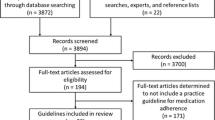Summary
Patient compliance refers to the willingness and ability of an individual to follow health-related advice, to take medication as prescribed, to attend scheduled clinic appointments and to complete recommended investigations. It is a major health issue, with outcomes related to levels of morbidity, mortality and cost utilisation. Poor compliance has been reported as the most common cause of nonresponse to medication, with evidence to show that patients who adhere to treatment recommendations have better health outcomes than those who do not adhere, even when taking a placebo. Evidence-based practice guidelines, founded on clinical, behavioural and educational concepts, provide a means of measuring outcomes related to health status, patient satisfaction and cost-benefit issues, and may help to ensure that responsibility for compliance is shared between the clinician and the patient.
Similar content being viewed by others
References
Sackett DL, Snow JC. The magnitude of compliance and non compliance. In: Haynes RB, Taylor DW, Sackett DL, editors. Compliance in health care. Baltimore: Johns Hopkins University Press, 1979: 11–22
Fedder DO. Managing medication and compliance: physician-pharmacist-patient interaction. J Am Geriatr Soc 1982; 30: S113–7
Horowitz RI, Horowitz SM. Adherence to treatment and health outcomes. Arch Int Med 1993; 153: 1863–8
Moore C. Ballooning drug costs [news item]. Christchurch Press 1996 Nov 26: 13
Doughty R, Sharpe N, MacMahon S. Hospital admissions and deaths due to congestive heart failure in New Zealand, 1988–91. NZ Med J 1995; 108: 473–5
Probstfield JL, Borhani NO, Cutler JA, et al. Adherence to lifestyle changes and pharmacotherapy among elderly individuals in clinical trials. Proceedings of the workshop titled Inclusion of Elderly Individuals in Clinical Trials. American College of Cardiology; 1992 Sep 15–16; Bethesda (MD), 155–63
Haynes RB. Determinants of compliance: the disease and the mechanics of treatment. In: Haynes RB, Taylor DW, Sackett DL, editors. Compliance in health care. Baltimore: Johns Hopkins University Press, 1979; 49–62
Murphy J, Gamble G, Sharpe N. Readability of subject information leaflets for medical research. NZ Med J 1994; 107: 509–11
Esposito L. The effects of medication education on adherence to medication regimens in the elderly population. J Adv Nurs 1995; 21: 935–43
Lipton HL, Bird JA. The impact of clinical pharmacists consultations on geriatric patients compliance and medical care use: a randomised trial. Gerontologist 1994; 34: 307–15
Cramer JA, Mattson RH, Prevey ML, et al. How often is medication taken as prescribed? JAMA 1989; 261(22): 3273–7
Klocke RA. Ethics of monitoring patient adherence [editorial]. Am J Respir Crit Care Med 1994; 149: 286
Swenson TR, Pekarik G. Interventions for reducing missed appointments at a community mental health centre. Community Ment Health J 1988; 24(3): 205–18
Macharia WM, Leon G, Rowe BH, et al. An overview of interventions to improve compliance with appointment keeping for medical services. JAMA 1992; 267(13): 1813–7
Orr PR, Blackhurst DW, Hawkins BS. Patient and clinic factors predictive of missed visits and inactive status in a multicentre clinical trial. Controlled Clin Trials 1992; 13: 40–9
Probstfield JL, Russell ML, Insull W, et al. Dropouts from a clinical trial, their recovery and characterisation: a basis for management and prevention. In: Handbook for health behaviour. New York: Springer Publishing Co., 1990: 376–400
Murray MD, Birt JA, Manatunga AK, et al. Medication compliance in elderly outpatients using twice daily dosing and unit use of packaging. Ann Pharmacother 1993; 27: 616–21
Putnam DE, Finney JW, Barkley PL, et al. Enhancing commitment improves adherence to a medical regimen. J Consulting Clin Psychol 1994; 62(1): 191–4
Raynor DK, Booth TG, Blenkinsopp A. Effects of computer generated reminder charts on patients compliance with drug regimens. BMJ 1993; 306: 1158–61
Wright EC. Non compliance — or how many aunts has Matilda? Lancet 1993; 342: 909–13
Haynes RB, McKibbon KA, Kanani R. Systematic review of randomised trials of interventions to assist patients to follow prescriptions for medications. Lancet 1996; 348: 383–6
Author information
Authors and Affiliations
Rights and permissions
About this article
Cite this article
Murphy, J., Coster, G. Issues in Patient Compliance. Drugs 54, 797–800 (1997). https://doi.org/10.2165/00003495-199754060-00002
Published:
Issue Date:
DOI: https://doi.org/10.2165/00003495-199754060-00002




